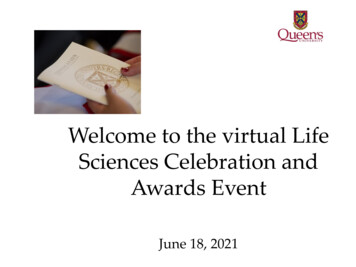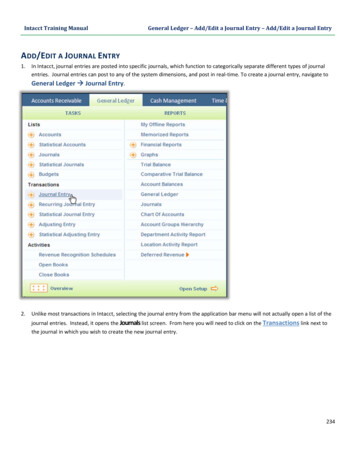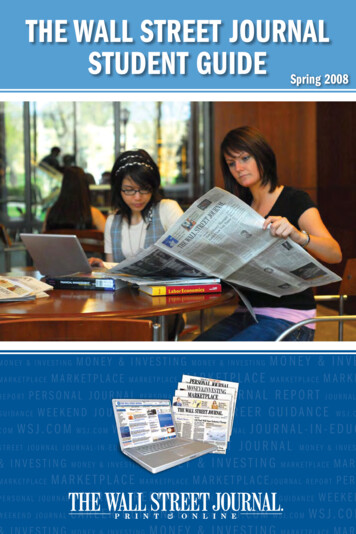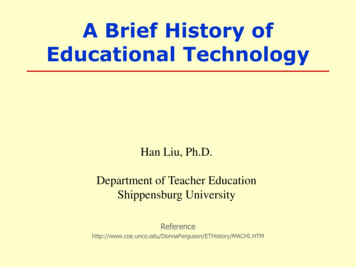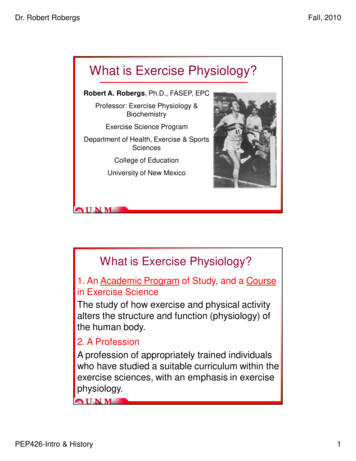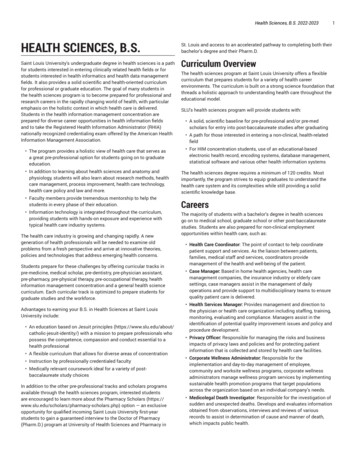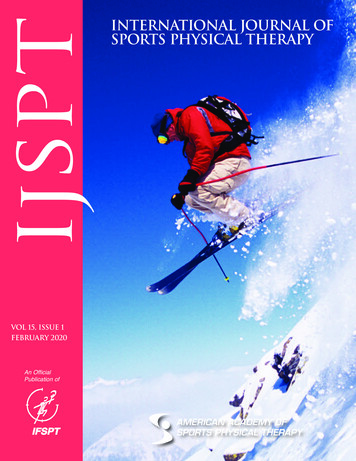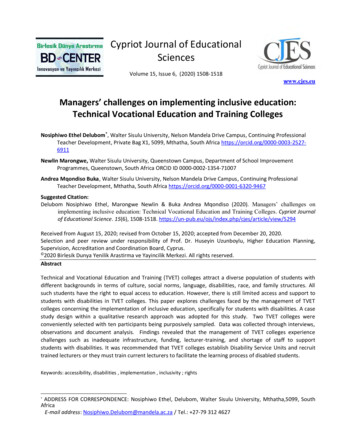
Transcription
Cypriot Journal of EducationalSciencesVolume 15, Issue 6, (2020) 1508-1518www.cjes.euManagers’ challenges on implementing inclusive education:Technical Vocational Education and Training CollegesNosiphiwo Ethel Delubom*, Walter Sisulu University, Nelson Mandela Drive Campus, Continuing ProfessionalTeacher Development, Private Bag X1, 5099, Mthatha, South Africa https://orcid.org/0000-0003-25276911Newlin Marongwe, Walter Sisulu University, Queenstown Campus, Department of School ImprovementProgrammes, Queenstown, South Africa ORCID ID 0000-0002-1354-71007Andrea Mqondiso Buka, Walter Sisulu University, Nelson Mandela Drive Campus, Continuing ProfessionalTeacher Development, Mthatha, South Africa https://orcid.org/0000-0001-6320-9467Suggested Citation:Delubom Nosiphiwo Ethel, Marongwe Newlin & Buka Andrea Mqondiso (2020). Managers’ challenges onimplementing inclusive education: Technical Vocational Education and Training Colleges. Cypriot Journalof Educational Science. 15(6), 1508-1518. 5294Received from August 15, 2020; revised from October 15, 2020; accepted from December 20, 2020.Selection and peer review under responsibility of Prof. Dr. Huseyin Uzunboylu, Higher Education Planning,Supervision, Accreditation and Coordination Board, Cyprus. 2020 Birlesik Dunya Yenilik Arastirma ve Yayincilik Merkezi. All rights reserved.AbstractTechnical and Vocational Education and Training (TVET) colleges attract a diverse population of students withdifferent backgrounds in terms of culture, social norms, language, disabilities, race, and family structures. Allsuch students have the right to equal access to education. However, there is still limited access and support tostudents with disabilities in TVET colleges. This paper explores challenges faced by the management of TVETcolleges concerning the implementation of inclusive education, specifically for students with disabilities. A casestudy design within a qualitative research approach was adopted for this study. Two TVET colleges wereconveniently selected with ten participants being purposively sampled. Data was collected through interviews,observations and document analysis. Findings revealed that the management of TVET colleges experiencechallenges such as inadequate infrastructure, funding, lecturer-training, and shortage of staff to supportstudents with disabilities. It was recommended that TVET colleges establish Disability Service Units and recruittrained lecturers or they must train current lecturers to facilitate the learning process of disabled students.Keywords: accessibility, disabilities , implementation , inclusivity ; rights*ADDRESS FOR CORRESPONDENCE: Nosiphiwo Ethel, Delubom, Walter Sisulu University, Mthatha,5099, SouthAfricaE-mail address: Nosiphiwo.Delubom@mandela.ac.za / Tel.: 27-79 312 4627
Delubom Nosiphiwo Ethel, Marongwe Newlin & Buka Andrea Mqondiso (2020). Managers’ challenges on implementing inclusive education:Technical Vocational Education and Training Colleges. Cypriot Journal of Educational Science. 15(6), 1508-1518. 2941. IntroductionTechnical and Vocational Education and Training (TVET) colleges are institutions that fall under theumbrella of the Department of Higher Education and Training (DHET). They admit learners with theminimum of a Grade 9 pass for National Vocational Certificate (NCV) programmes, EngineeringNational Accredited Technical Education Diploma (Nated) programmes, and learners with Grade 12 forpost-matric programmes (DHET, 2016). The TVET sector attracts a diverse population of studentsincluding those with disabilities, socio-cultural and linguistic differences, contrasting economicbackgrounds and family structures, including various genders, races and ethnicities (Bryant, Bryant, &Smith, 2016). In South Africa, the inclusive education concept was introduced during the postapartheid era after many years of racial discriminatory practices (Dalton & Lyner-Cleophas, 2019).In 2001, the White Paper 6: Special Needs Education, was developed which clearly defined the processof inclusive education by advocating the inclusion of children with disabilities into mainstream schools,as well as recommending the changing of Special Schools into full service schools and resourcecentres. However, it focused on children in the primary and secondary schools and was silent aboutpost-school education and training. In 2013, the White Paper for Post School Education and Trainingwas developed and approved by the Cabinet (DHET, 2013) which promoted a post-school system thatrecognised the right to access an educational institution regardless of, among others, race, age, anddisability. It addresses the post-school sector that includes HEIs and TVET Colleges. The White Paperon Rights of People with Disabilities (2015) reveals that most youths between the ages of 20-24 werenot attending any tertiary education institution (Department of Social Development, 2015).Consequently, all the relevant legislative frameworks in South Africa emphasised the importance forthe inclusion of disability in the SA education system.Although it is a legislative mandate to accommodate students with disabilities in all the institutions ofhigher learning, research shows that there are still some barriers in fulfilling this transformationagenda (Mosia & Pasha, 2017). This study explores the challenges experienced by management onthe implementation of inclusive education in TVET colleges. Since there is a paucity of research on theinclusion of students with disabilities in TVET colleges, the authors have dissected the limitationsregarding the implementation of inclusive education in TVET Colleges. Accordingly, one area toinvestigate is whether TVET managers have extensive and relevant knowledge about inclusiveeducation, and to what extent are they informed of their mandate to address issues of inclusion anduniversal access in HEIs. Hence, this paper, in addition to exploring the challenges, recommends bestpractice strategies for the effective implementation of inclusive education at TVET Colleges.2. Method2.1 ApproachA case study design within a qualitative research approach was adopted for the study. The qualitativeapproach was suitable since the researchers were interested in the depth of human experienceincluding all the personal and subjective peculiarities that are characteristic of individual experiencesand meanings associated with the phenomenon under study (Du Plooy-Cilliers, Davis, & Bezuidenhout,2015). Further, the qualitative approach was appropriate since it analyses feelings, attitudes,perceptions and views, because this study’s aim was to provide in-depth insight into the managers’challenges on the implementation of inclusive education.1509
Delubom Nosiphiwo Ethel, Marongwe Newlin & Buka Andrea Mqondiso (2020). Managers’ challenges on implementing inclusive education:Technical Vocational Education and Training Colleges. Cypriot Journal of Educational Science. 15(6), 1508-1518. 2942.2 SamplingTwo colleges were conveniently selected as research sites. Considering that one of the authors onceworked at one of the chosen TVET college sites, caution was exercised not to compromise the qualityof the study. Access to these colleges was smooth; hence, the use of the convenient sampling methodto identify the TVET colleges for the collection of data. Also, purposive sampling was utilised as atechnique to select the participants. Since the aim of this paper was to explore the challenges ofmanagers on the implementation of inclusive education in TVET colleges, college principals, deputyprincipals (academic services), and campus managers were purposely sampled, as it was assumed thatthey had rich information and were willing to provide the necessary information. Additionally, theysupervised staff who were dealing with students with disabilities. Also, the study purposivelyidentified lecturers (as participants) who were teaching students with disabilities for them to providemore information on the challenges of implementing inclusive education. Table 1 (below) indicatesthat this study selected ten (10) participants.Table 1: Number of participants used in the studyParticipantsCollege ACollege BCollege Principals11Deputy Principals (AcademicServices)11Campus Managers11Lecturers225 105Total2.3 Data collection instrumentsData was collected from two TVET colleges using individual face-to-face interviews, observations anddocument analysis. Three data collection instruments were used. Semi-structured interviews wereused; probes and follow-up questions were also used where the questions and answers were notclear. The data collection tool was trustworthy since questions asked from the participants wererelevant to the aim of the study that required managers’ challenges on implementation of inclusiveeducation. Two main questions were asked from the interviews; What challenges are the managersfacing in implementing inclusive education? How do managers plan to overcome them? Probing andfollow up questions followed when answers were not clear.2.4 InterviewsFace-to-face interviews were conducted in the study for eliciting in-depth information pertaining toTVET managers’ challenges concerning the implementation of inclusive education. The authorsarranged appointments with the participants regarding the structuring of a time-table to conductinterviews. The authors and participants were in possession of an interview schedule which indicatedthat each session will be of 45-60 minutes duration. An audio-recorder was used to record interviewsessions, after which all recorded data was transcribed.1510
Delubom Nosiphiwo Ethel, Marongwe Newlin & Buka Andrea Mqondiso (2020). Managers’ challenges on implementing inclusive education:Technical Vocational Education and Training Colleges. Cypriot Journal of Educational Science. 15(6), 1508-1518. 2942.5 ObservationsOnly after permission was sought from the relevant authorities, was an observation of the physicalinfrastructure of the research sites conducted; this included observation during lectures. Observationswere noted in writing.2.6 Document analysisTo complement the interview data, documents were analysed. These included minutes of meetings,reports, strategic planning documents, and policies.2.7 Data analysisData was presented, interpreted and analysed using the Interpretative Phenomenological Analysis(IPA) method to unpack participants’ responses of their personal experiences concerning inclusiveeducation at TVETs (Smith, 2011). As such, IPA provides an insider’s interpretation of the topic anduses individual cases as the basis for explaining broader social issues (Larkin, Watts, & Clifton, 2006).Following each interview, we listened to the recordings and then analysed the transcripts to identifythe themes and sub-themes that link to each other. Some of the participants’ responses were writtenverbatim such that thick descriptions were used to analyse data.2.8 Ethical considerationsMertens (1998) contends that ethical guidelines in research are required to guard against any possibledilemmas. Permission was sought from the two TVET colleges in the Eastern Cape Province.Additionally, the study adhered to the ethical consideration of protecting the participants fromphysical and mental harm. Written voluntary consent to record the interviews was sought from theparticipants to whom the purpose and relevant details of the study were adequately explained. Theconsent form was signed before the commencement of interviews, and the aspect of confidentialitywas addressed which included the use of codes and the password-secure electronic storage ofinformation. Participants were identified by codes: College Principal (CP), Deputy Principal (DP),Campus Manager (CM), and Lecturer (L).3. FindingsAs indicated earlier on, coding was used to protect the identities of the two colleges and theparticipants, as indicated in Table 2 below.Table 2. Coding of participantsCollege ACollege BCollege Principal-CPACPBDeputy Principal-DPADPBCampus Manager-CMACMBLecturer 1-LA1LB11511
Delubom Nosiphiwo Ethel, Marongwe Newlin & Buka Andrea Mqondiso (2020). Managers’ challenges on implementing inclusive education:Technical Vocational Education and Training Colleges. Cypriot Journal of Educational Science. 15(6), 1508-1518. 294This paper presented findings that emerged from the responses of the participants. Findings arecategorised into themes: infrastructure, lack of training for lecturers, funding, and staffing.3.1 InfrastructureThe issue of infrastructure was mentioned several times by participants as a challenge that is regardedas the root cause of colleges not being fully ready to implement inclusive education or to admitstudents with disabilities. At College A, it was observed that the high reception counters were notaccessible for a person who uses a wheelchair, there are stairs and no lifts or wheelchair ramps in oneof the buildings where lectures are conducted, and door handles were not user-friendly for disabledpeople.In College B, it was observed that some buildings are “ancient” and have many long staircases and oldlifts. In addition, stairways did not have contrasting stripes to accommodate partially-sighted people.However, there was a gate for wheelchair-users leading to a ramp that led to the lecture halls. Atboth colleges’ lecture halls, the desks were of the same size, not suitable for accommodating personsusing wheelchairs. In front of the buildings there were parking bays that had signage for people withdisabilities. One of the participants indicated that they were not admitting blind students becausetheir infrastructure was not yet adapted to accommodate them. When a blind student applies foradmission, he/she would be referred to the organisations they are working with. Both colleges did nothave transport vehicles that were geared for easy entry and exit for disabled students. Theparticipants confirmed that they did not have disabled students who needed transport. Moreover, onperusal of the colleges’ documents, there was no plan for adapting the infrastructure to accommodatean Inclusive Teaching and Learning environment. The plan tabled the improvement of the generalinfrastructure but was not specific in terms of priorities and time-frames. Below are some responsesthat were recorded from the participants regarding the aspect of infrastructure:CPA: Our infrastructure is not accessible; of course, there are two campuses that havelifts, but it is difficult to be vocal and say we are ready to admit students with disabilities,especially those in the severe categories.CPB: Yes, the infrastructure is a big challenge, but it does not mean we cannot admitstudents with disabilities because it is a human right.DPA: We are still very behind on infrastructure - even the principal’s office is not userfriendly. It is upstairs and there is no ramp, only stairs. In another campus, the path to thecomputer lab is very steep, and no student in a wheelchair can access it.DPB: There is not much that we have done to improve infrastructure. We only respond tothe needs that we identify. For example, when there is a need of a ramp, it will be build it.CMB: We cannot admit blind students because we do not have computers that can dobraille work, and there is no budget for that. When there are no funds, it becomes difficultto purchase such items.LA1: Our lecture venues are not disability-friendly; there are stairs only. In some buildingswe have no ramps. Even in buildings that have lifts, maintenance is poor.LA2: We still have a long journey to go when it comes to infrastructure. Buildings are allnot accessible to disabled persons. I feel the college is not yet ready.3.2 Lack of training for lecturers1512
Delubom Nosiphiwo Ethel, Marongwe Newlin & Buka Andrea Mqondiso (2020). Managers’ challenges on implementing inclusive education:Technical Vocational Education and Training Colleges. Cypriot Journal of Educational Science. 15(6), 1508-1518. 294Most participants were unanimous that generally lecturers lacked the necessary skills and knowledgein dealing with students who had disabilities, thus the urgency for training. It is evident fromdocument analysis, observations and interviews that relevant qualifications, experience and trainingof lecturers on inclusive education is not prioritised. Since lecturers deal directly with students in thelecture rooms, it is imperative for them to possess the necessary tools to deal with students withdisabilities. Regrettably, lecturers indicated that they did not receive the necessary support from theirsenior management regarding further training. The following responses substantiate this:LA2: I never received any training or attended any workshop related to inclusiveeducation here at the college. The only time I attended an inclusive education workshopwas when I was teaching at a secondary school; I am using that experience, though it isnot enough because I find it difficult to identify a student who has an “invisible” disability.CMA: For me, what these lecturers are doing is enough because some of them do not evenhave a qualification to be lecturers; they are coming from industry and have no teachingqualifications.CMB: Our lecturers manage to identify some students who reveal symptoms of havingspecial needs and refer them to counsellors.CPA: Policies are there to guide DPs for implementation, but the trend with colleges acrossthe spectrum is that there are senior managers who sit in positions but do not havecompetencies to perform their functions. Moreover, the Department confuses us; it hastaken over the function of training and development, including the budget. The collegecoordinates and the Department approves, then it acts depending on what is its priority.CPB: We have not yet started the training of lecturers - that part is still a big challenge forus.LA1: I had a student who could not write. I did not know how to help the student so thestudent de-registered for the trimester.LBI: We are not trained to deal with these situations. I just refer the students withchallenges to the counsellor.DPA: I am aware that coordination of training for lecturers is the responsibility ofAcademic Services and Human Resource. I understand it is still a gap and needs to beprioritised.DPB: It is my function to coordinate the training, but it could be better if the call comesfrom the Department because some managers display resistance; they are moreconcerned about their functions but forget that some functions overlap.These above responses confirm the lack of training for lecturers as indicated in the minutes of theAcademic Board from College A. Moreover, there was no item that addressed the issue of lecturers’training in terms of inclusive education. In College B, the Inclusive Teaching and Learning plan wassilent about the professional development of lecturers.3.3 FundingThe study progressed to elicit data relevant to the funding of students with disabilities. The responsesfrom the participants of both colleges were very similar. Both College Principals (CPA and CPB)indicated the lack of funding as a critical factor that impeded the implementation of inclusive1513
Delubom Nosiphiwo Ethel, Marongwe Newlin & Buka Andrea Mqondiso (2020). Managers’ challenges on implementing inclusive education:Technical Vocational Education and Training Colleges. Cypriot Journal of Educational Science. 15(6), 1508-1518. 294education. They indicated that colleges were governed by the national Department of HigherEducation and Training (DHET) and they did not have autonomy like universities. Colleges weretreated like schools based on their history of being under the Department of Education for quite a longtime (RSA, DoE, 2012). There was no funding for support, and the only funding that they received fromDHET was for the needs of the students that they submitted reports for. For example, if theysubmitted reports for ten students that they admitted, DHET would give them a specific amountrelative to ten students.There was no funding to purchase adaptive technological equipment or to improve the infrastructure.Also, they are not allowed to implement what DHET did not specify in the budget. Moreover, CampusManagers indicated that they depended on the Administration Centre when it came to funding, whilelecturers indicated that they were not informed about funding matters. Below are responses thatwere garnered on the issue of funding:CPI: Funding is ring-fenced by the Department. Colleges are instructed on what to do.CP2: As colleges, we must do what we are told to do, but we still don’t have money toimprove the situation.CPA: As colleges, we do not have an autonomy like universities, although we have beenfighting for it.CPB: All fifty colleges in South Africa have no autonomy. They rely on DHET. All policiesincluding finance have the DHET logo, not the college name.DPA: Even if the college needs to be innovative, but if it is not part of DHET’s priority, it isignored.CPA: It becomes difficult when the college does not have financial muscle.CMA: As a Campus Manager I submit my needs for the campus, but I am always told thatthere are no funds. Our budget is centrally-based at the Administration Centre.LA2: I know nothing about college finances.LBI: Issues of finance are regarded as not being important for lecturers.3.4 StaffingThe participants mentioned the continual shortage of staff as being an obstruction to supportingstudents with disabilities. In College A, there is a Student Counsellor who was assisting withchallenges of inclusive education at the Administration Centre. In other campuses there were CareerGuidance Officers who were providing counselling services. In addition, there was an official who wasdeployed by Higher Health for a period of three years to provide disability services to students. InCollege B, there was a Disability Coordinator who was responsible for inclusive education anddisability services for all campuses. The following responses demonstrate staffing anomalies:CMA: To me the Career Guidance Officers do not serve the purpose for disability matters.They are responsible to provide counselling to the general student population. If there isno official specifically responsible to support students with disabilities in the campus, suchstudents are still going to suffer.CMB: A qualified person who can deal with students who have disabilities is a dire need.1514
Delubom Nosiphiwo Ethel, Marongwe Newlin & Buka Andrea Mqondiso (2020). Managers’ challenges on implementing inclusive education:Technical Vocational Education and Training Colleges. Cypriot Journal of Educational Science. 15(6), 1508-1518. 294DPA: The fact that there is only a Student Counsellor who is located at the AdministrationCentre, does not serve the purpose. The official who deals with inclusive education orsupporting students with disabilities must be in the campuses and be visible to suchstudents.CPA: We do not have a stand-alone unit because there is no designated personnel;however, we have a person from the Higher Health who assists with disability services.CPB: We have established the unit and have one person, but I know other colleges do nothave units because they do not have funds to employ staff.LB2: To me if there is no person responsible to support students with disabilities in thecampus; it means students will suffer as it is difficult to identify those who have “hidden”disabilities.LA1: I am so fortunate because in my class there are no students with disabilities, so theissue of shortage of staff does not affect me.4. DiscussionFindings reveal that the challenge of inadequate and inaccessible infrastructure was concerningbecause this acted as a barrier to students with disabilities with regards to the possibility of enrollingwith the institution. This key finding is in line with the study that was conducted by Nkalane (2018)that was based on Inclusive Assessment Practices in Vocational Education in one of the TVET Collegesin South Africa which established that TVET colleges were recapitalised through massive Governmentinvestment to improve their infrastructure, introduce a more relevant curriculum, retrain lecturers,and assist college students financially to access learning programmes. The infrastructure that wasobserved by the researchers was not disability-friendly. Further, the documents that were analysedduring this study had no clear indication of future revamping plans or putting in place disabilityfriendly infrastructure. This confirms the findings established by other studies on students withdisabilities in HEIs that indicated that physical access into institutions was a challenge (Mutanga, 2017;Tugli, Zungu, Goon, & Anyanwu, 2013). Additionally, Buthelezi (2014) conducted a study on thechallenges faced by students with disabilities at a TVET college in KwaZulu-Natal and found thatstudents with physical disabilities experienced accessibility constraints to reach the library, lecturehalls, and parking spaces.This paper recommends that management should ensure that the buildings are accessible-friendly toall people, especially the disabled. Accordingly, lecture rooms and laboratories should be adapted orrestructured such that they accommodate a diversity of students. It is the responsibility ofmanagement to ensure that the day-to-day running of the college takes place within an infrastructurewhere buildings and fixtures are user-friendly to all (Balkrishen, 2016). This is in line with the SocialModel of Disability that views disability centrally as a social construct created by an ability-orientatedenvironment (Chiwandire, 2019). Donohue and Bonman (2014) suggest that funding should beincreased so that colleges execute infrastructural changes that are urgently needed. On the positiveside, the study found that at least there were plans for TVET colleges to modify labs to accommodatestudents with disabilities - labs with computers that have adaptive technology to accommodatestudents who have visual impairments, as well as for those who have multiple disabilities. This was notspecifically indicated in the Strategic Planning document and the minutes of meetings (2019) of thetwo TVET colleges. It would have been encouraging if these plans were detailed with specific time1515
Delubom Nosiphiwo Ethel, Marongwe Newlin & Buka Andrea Mqondiso (2020). Managers’ challenges on implementing inclusive education:Technical Vocational Education and Training Colleges. Cypriot Journal of Educational Science. 15(6), 1508-1518. 294frames and projects to accommodate inclusive education; not just on paper but to be implementedpractically and expeditiously.Also emanating from the findings was the lack of training for lecturers on inclusivity. This was a graveconcern as lecturers are directly involved with students daily. It is very much evident that lecturers’attitudes towards inclusion might become more positive if, along with training, they were to receivethe appropriate service support from the management for them to deal with students with disabilities.This notion corresponds with that of Dalton, Lyner-Cleophas, Fergusson and McKenzie (2019) whostate that stereotypical attitudes and problems of accessibility have made the implementation ofinclusive education to be elusive. Further, a study conducted in Cameroon reveals that inclusiveeducation is best managed when qualified teachers and related service personnel are available (Mngo& Mngo, 2018). The training that is offered to lecturers is one of the important factors that canenhance the quality of education that is provided to students (Carew, Deluca, Groce, & Kett, 2019).The current study established that the lack of training for lecturers had a negative impact on thepossible admission of students with disabilities in TVET colleges; for instance, limited programmeswere offered to students with disabilities; but well-trained and qualified lecturers will expand thewidth of programmes.The revelation that some lecturers did not have a relevant teaching qualification is similar to the studyconducted by Nkalane (2018) who found that some lecturers did not have professional qualificationsin education but were experts in the banking sector. The current study established that it was verydifficult for lecturers without a teaching qualification to effectively teach students with disabilities andapply innovative teaching strategies that could accommodate all students. We argue that if disabilitycan be perceived as a social model phenomenon, perspectives of management around disability willchange and they will see the need for the professional development of lecturers. In addition, Nkalane(2018) observed in her study that lecturers cannot support students holistically because they do nothave the required skills to teach students with learning difficulties and disabilities. When lecturers arenot trained in inclusive education or in the Universal Design for Learning (UDL), they will find it difficultto plan and develop assessments that accommodate all students (Greyling, 2009). Hence, this will leadto them developing a resistance to change towards inclusive assessments. The professional training oflecturers to implement and design inclusive assessments is a prerequisite which can be possiblethrough re-training (Ntombela, 2011).The lack of a coordinated and collaborative involvement of management and DHET to facilitate theprovision of professional development courses for lecturers has been identified as a major
regarding the implementation of inclusive education in TVET Colleges. Accordingly, one area to investigate is whether TVET managers have extensive and relevant knowledge about inclusive education, and to what extent are they informed of their mandate to address issues of inclusion and universal access in HEIs.
